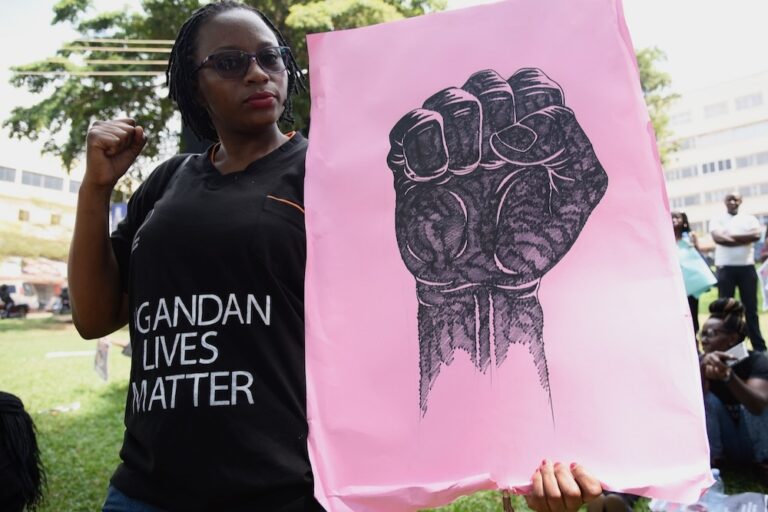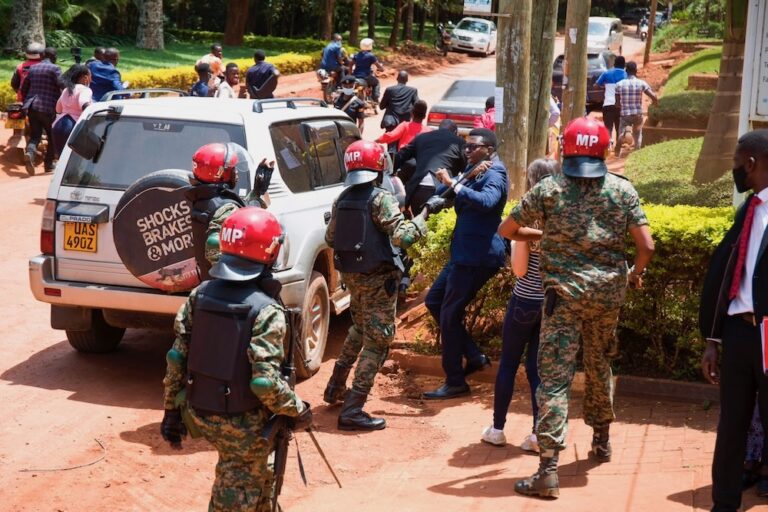In the first six months of 2010, over 30 journalists reported harassment or suffered some kind of abuse at the hands of state bodies or media-targeting mobs.
(HRNJ-Uganda/IFEX) – Kampala, 7 September 2010 – Human Rights Network for Journalists-Uganda (HRNJ-Uganda) is concerned about the declining safety and security environment for journalists in Uganda, and the growing overall threat to freedom of expression in the country. With the increased reports of killing, beating, arrests, assaults, and threats to journalists while on duty by either the state authorities or the public, the space under which the media exercises its fundamental rights and freedoms is increasingly being narrowed.
Journalists are messengers. To infringe on their freedom to operate is to violate the very principle of freedom of expression as stated in the Constitution of the Republic of Uganda, and the Declaration of Human Rights and other international declarations, to which Uganda is a signatory.
We call upon the government of Uganda to safeguard, protect, uphold and ensure that such fundamental rights and freedoms are fully enjoyed, by protecting the agents of this freedom, the media.
We are seeing a dangerous trend, which is a threat to the journalism profession.
Growing impunity
In the first six months of 2010, over 30 journalists reported harassment or suffered some kind of abuse at the hand of state organs or media-targeting mobs.
The chairman of the Broadcasting Council, Eng Godfrey Mutabazi, arbitrarily closed down five radio stations, Central Broadcasting Services (88.8fm and 89.2), Ssuubi fm, Radio Two and Radio Sapientia, and he suspended journalists during last year’s September protests.
Three stations have since been re-opened; however, none of the radios have been taken to court to justify their closure or re-opening. Out of 18 journalists who were suspended on orders of the Broadcasting Council (BC), only 8 have been reinstated secretly, while the rest continue to suffer BC’s wrath. However, they have never been charged in court for any wrongdoing. However one journalist, Kalundi Sserumaga, who sought court intervention over his suspension, has not had his case heard.
Mutabazi has also directed a privately-owned radio, Voice of Lango, to suspend two presenters (Akena Patrick Ronex and Joe Orech) for hosting the president of Uganda People’s Congress (UPC), Olara Otunnu, on 12 April 2010.
Mutabazi has therefore caused the regulatory body to lose its moral authority of overseeing and promoting the media interests, and the IGG should investigate and intervene in his case.
Attacks occurring in the last few months have been particularly disturbing. Paul Kiggundu, a journalist working with Top Radio, was killed by a mob in Rakai while on duty. Another journalist, Dickson Kiggundu, in Mukono, met his death on his way home from work. He was working with Seventh Day Adventist Church-based Radio Prime. Also, a female colleague, Wilbroad Kasujja, a news anchor with Buwama Community Radio, was raped before she was killed. There are many more examples and we are saying: this must stop.
According to research conducted by HRNJ-Uganda, the police and security forces are also implicated in violations to freedom of expression, and have been accused of abusing journalists directly. In the first half of 2010, the police were connected to 12 cases of abuse committed against journalists.
HRNJ-Uganda’s mid-year report also states seven cases where individual members of the public have assaulted journalists; three cases were reported against Para-military groups, two against the Uganda Peoples’ Defense Force (UPDF), two cases against the State and one against Regulatory bodies.


